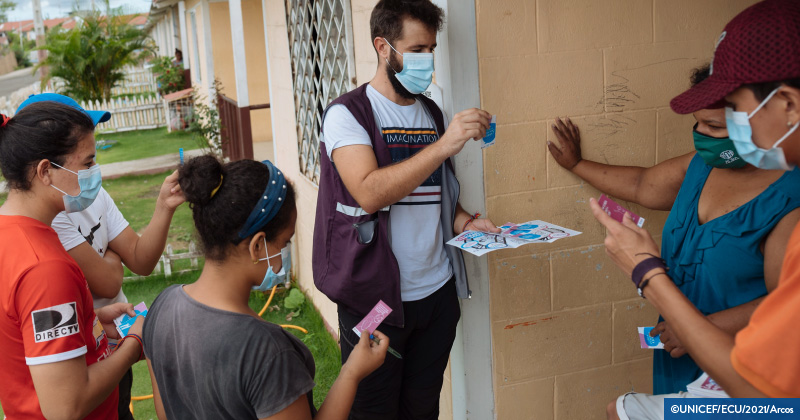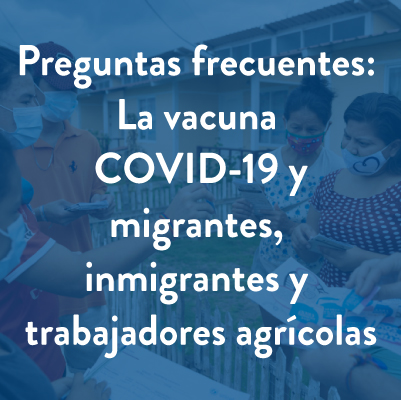- Who We Are
- Clinician Employment
- Publications
- Witness to Witness (W2W)
- El Premio Kugel & Zuroweste a la Justicia en la Salud
- Your Voice Matters: Photovoice Project
Wed, 09/08/2021 | by Robert Kinnaird


Interpreters and interpretation hotlines are key tools for clinicians when they do not share a common language with their patients. While interpreters may work full time or part time in the office or clinic, hotlines generally work by passing a phone between the doctor and patient as a third party aids in communication. These means of communication are especially vital in the medical field, where a complete understanding of a patient’s symptoms can be the difference between an accurate diagnosis and an inaccurate one, and patients need to be able to understand their own medical information. Clear communication has been especially important during the pandemic, as issues like widespread misinformation about vaccines and a concerning distrust of the medical establishment further complicate efforts to encourage COVID-19 vaccination among migrant, immigrant, and refugee communities. In a recent online seminar, Migrant Clinicians Network, in partnership with NRC-RIM, took a deeper look into promising practices in interpretation, to help clinicians better serve migrant, immigrant, and refugee patients whose primary language is not that of the clinician.
To make the most of interpreters, clinicians need to keep the needs of the interpreter in mind. Avoid idioms, acronyms, and difficult-to-translate jargon, as those can make an interpreter’s job unnecessarily difficult. By sticking with clear and concise language, the interpreter can better communicate with patients, allowing patients to better understand their health.
It can also be important to make it clear to both the interpreter and the patient when you are addressing the interpreter directly. Asking the interpreter if they need a break can be important. Since they are talking for two in two different languages, the conversation may be more straining for them than for the clinician or patient. If you just ask, “Do you need a break?” the interpreter may think you are directing this question at the patient. It is better to say, “I am going to ask the interpreter if they need a break,” so that the interpreter can pass that information on to the patient while also understanding that they can stop for a minute if they need to. Referring to the interpreter in the third person allows for clear communication with the patient while addressing needs that the interpreter might have.
Trained interpreters in various fields have codes of ethics that they must follow. The National Council on Interpreting in Health Care has this code of ethics that is useful for clinicians to familiarize themselves with, as to avoid putting an interpreter in an unethical or even questionable situation. A key point is that interpreters need to remain impartial. Clinicians should not ask the interpreter to weigh in with their opinion on a matter or expect the interpreter to take their side if there is a disagreement with a patient. It may also be important for the patient to know that the interpreter owes them the same medical privacy that a clinician does.
If a clinician has bilingual staff that aids with interpretation in office, it is important for the staff member to work only as an interpreter when that is the role they are filling. If a fellow clinician is interpreting a conversation, they should not weigh in with their medical opinion and should instead focus entirely on interpreting. Bilingual staff that would like to help with interpretation should receive some professional interpretation training in order to best understand the role they are operating in and the professional boundaries that interpreters need to mind.
No matter who is working as an interpreter in the workplace, it is important to document who that interpreter is in the event of miscommunication. If mistakes need to be rectified or if there are legal matters between the clinician and the patient, it can be important to have the name of the interpreter on record so that miscommunication can be figured out.
Finally, family members should never be called upon for interpretation. There can be problems among families where relatives may insist upon interpreting for their non-English speaking relatives. This can lead to situations where individuals may not feel comfortable with disclosing important medical information and the relative can potentially use their role as interpreter to control what kind of information makes it to the patient, such as hiding a potentially distressing diagnosis or information about reproductive health care. It is best to refuse family interpretation and insist upon using an interpreter that you can be sure will not influence the appointment due to their own connection with the patient.
Even for clinicians who may consider themselves proficient in multiple languages, interpreters and hotlines can be a vital tool for understanding nuances that an interpreter is able to pick up that a semi-fluent person may not. Bilingual staff may also not be fluent enough to interpret medical terminology. Many people who consider themselves fluent in multiple languages may not be ready to interact with patients and meet the needs of both the patients and the clinicians. Multilingual patients may also benefit from an interpreter’s presence. Like the staff, they may consider themselves fluent in a common language with the clinician, but that fluency could be limited in relevant topics to their appointment. Many immigrants may also have multiple languages they consider themselves comfortable speaking, but it is important not to assume which they might be most comfortable with and take the time to pair them with an interpreter that is able to speak their preferred language.
Language access is often a major barrier for health care. Making sure there are paths for communication with people who do not speak languages known by in-office clinicians is critical for the health of immigrants, refugees, and migrants within your community. By utilizing interpretation hotlines, hiring interpreters, and getting interpretation training for multilingual staff, clinicians can make sure they are providing the best health care they can for these vulnerable communities.
Watch Migrant Clinicians Network’s recent online seminar, “Community-Based Interpretation and the Road to Language Access: Promising Practices for Working with an Interpreter,” to hear more on this topic. This online seminar was the second half of a two-part seminar series on language access. Go to our Archived Trainings page to access both seminars, and many others, on heat stress, COVID-19, diabetes, intimate partner violence, Health Network, and more.
Got some good news to share? Contact us on our social media pages above.
Return to the main blog page or sign up for blog updates here.







